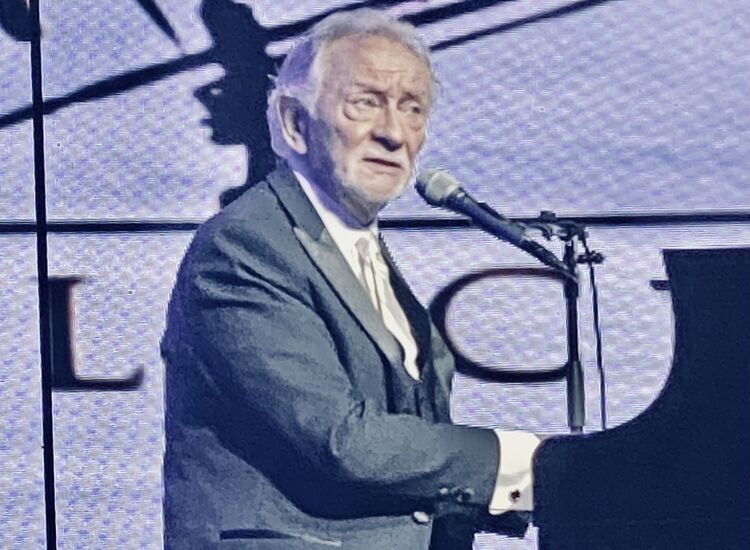G. Gordon Liddy pictured about 1964.
Between the Lines / By Peter McDermott
The death last week of G. Gordon Liddy at age 90 brought me back to my very early days in New York.
I remember I’d been sitting reading at the kitchen table when I noticed the murmur of a radio on a countertop. It belonged to one of the apartment’s other tenants, an Irishman with decidedly conservative views, I later learned.
I turned up the volume and was amazed to discover that there was such a thing as “The G. Gordon Liddy Show.” He was the guy who had, as Deep Throat (Hal Holbrook) revealed to Bob Woodward (Robert Redford) in “All the President’s Men,” applied a flame to his hand at a party until his skin burned. Asked what the trick was, Liddy said, “The trick is not minding.”
I was aware of the concept of right-wing talk radio, having once read an article about Rush Limbaugh in the Guardian. The writer’s way into that piece was a boozy lunch at which business executives admitted to taking not-so-guilty pleasure in the native Missourian saying the unsayable.
Liddy’s radio break came as a guest host on Bob Grant’s show. Grant, born Robert Ciro Gigante in Chicago, had a big following in his adopted New York metropolitan area. He was at his height when I was new here in the mid-1990s, and my first dentist in Queens always had him switched on, and quite high, too, as I recall. Maybe he believed conservatives would regard their dentist favorably and liberals would think “bring on the drill!” There was no indication if he agreed or disagreed with the content.
In his 2003 book “Midlife Irish,” comic writer Frank Gannon recalls that his devoutly Catholic immigrant father had a penchant for right-wing radio preachers. His favorite seemed to be Carl McIntire, who criticized Catholics a lot. Gannon says his father didn’t laugh much, but he did for some reason when McIntire said something horrible about Irish Catholics in particular. Once when the son asked if he could change to a music station, the elder Gannon said: “This is my place. When you get your own place, you don’t have to listen to McIntire. You can listen to your own crap.”
Grant was apparently a genius at keeping people listening, and had a huge influence on Howard Stern, for example. No doubt some are born for radio and that’s their thing; a more interesting story is someone with a varied career, including prison, getting a syndicated following of millions. Oliver North was another radio star whose main claim to fame was being caught up in a political scandal. In contrast, though, North testified before Congress about the Iran/Contra affair, and later his three convictions were vacated, and all charges dismissed.
Liddy said he was raised by his father not to be a “snitch” or a “rat” and indeed was fired by his boss, the former Attorney General and head of the Campaign to Re-elect the President John Mitchell, for refusing to cooperate with the FBI, an institution for which he once worked. He got the longest sentence, 20 years, of all the Watergate felons. President Jimmy Carter commuted it and ultimately he was released on Sept. 7, 1977, having served 52 months.
God and flag
Liddy was serving time, as were key White House aides Bob Haldeman and John Erlichman, when “All the President’s Men” debuted in theaters in 1976. Mitchell had been convicted, but had yet to enter the prison system.
Both Liddy and Mitchell were Fordham graduates incidentally. This came up in conversation about famous alumni with current president Fr. Joseph McShane when I interviewed him on the Rose Hill campus some years ago. He pointed out good-humoredly, though, that Mitchell wasn’t a Catholic.
Liddy was. As the Washington Post quotes him saying, “The nuns introduced me to authority. First, God. And then: The flag.”
The former Nixon henchman would in the 1980s form a famous alliance with someone with a rather different attitude to authority, Nixon enemy and LSD guru Timothy Leary. The pair staged debates together at various campuses around the country.
The Washington Post’s obituary said: “Mr. Liddy deplored Leary’s ‘very dangerous’ ideas while praising his ‘marvelous elfin sense of wit and Irish humor.’ Leary depicted Mr. Liddy as ‘intelligent,’ ‘highly educated’ and ‘deeply idealistic’ but attacked him for ‘turning America into a banana republic.’”
Liddy was also a son of Ireland, of County Clare presumably. But his Italian side could be detected; certainly he had brushiest mustache a political felon has sported since Bartolomeo Vanzetti of Sacco & Vanzetti fame, on the other end of the spectrum.

Attorney General John Mitchell.
He said he’d transformed himself in his early years from a “puny, fearful boy to a strong, fearless man.”
The Los Angeles Times obituary reported a 2004 interview he gave about his childhood, “Hitler’s sheer animal confidence and power of will entranced me. He sent an electric current through my body.”
Liddy graduated from Fordham in 1952, and after a stint in the armed forces, returned to study at Fordham Law School. After graduating in 1957, he joined the FBI. He stayed until 1962.
The Washington Post said, “According to former FBI officials quoted by journalist and author J. Anthony Lukas Mr. Liddy was pushed out because he was a ‘wild man’ and a ‘superklutz.’”
Liddy worked with his father’s law firm before becoming an assistant prosecutor in Dutchess County, N.Y. in 1966.
The Times wrote: “In 1968, he began a dizzying, three-year rise from obscurity in Poughkeepsie to the White House. Challenging Hamilton Fish Jr. in a primary for the Republican nomination for Congress in what was then New York’s 28th District, he fell short, but his consolation prize was to take charge of the Nixon campaign in the mid-Hudson Valley, which the president won handily.”
In his Watergate-era days, according to the Times, Liddy suggested “killing the syndicated columnist Jack Anderson, whom Mr. Liddy viewed as a national security risk” (however, this seems to have been based on his interpretation of a White House memo saying it wanted to “get rid” of Anderson).
A more philosophical Liddy wrote in the bestseller “Will,” the obituaries reported, “I had learned long ago the maxims of Cicero that ‘laws are inoperative in war’ and that ‘the good of the people is the chief law.’”
The Washington Post said that co-conspirator E. Howard Hunt described him as “a wired, wisecracking extrovert who seemed as if he might be a candidate for decaffeinated coffee.”
It continued, “At the same time, he was viewed by his superiors as ‘a little nuts,’ in Nixon’s phrase. ‘I mean, he just isn’t well screwed on, is he?’ the president complained to chief of staff H.R. Haldeman a week after the break-in.”
In her classic account of the Watergate affair, “Washington Journal,” Elizabeth Drew quotes columnist Joseph Alsop saying that people in the Nixon entourage “were uneasily aware that Liddy often carried a gun and was quite capable of using it.”
He was known to have shot out a light spying on the McGovern headquarters.
A top Committee to Re-elect the President official Jeb Stuart Magruder, who later went to prison, testified before a Watergate congressional committee in 1973: “I simply put my hand on Mr. Liddy’s shoulder and he asked me to remove it and indicated that if I did not, serious consequences would occur.”
Added the Washington Post’s obituary, “The director of the nonprofit National Security Archive, Tom Blanton, said Mr. Liddy ‘brought out the worst’ in Nixon and his aides, ‘raising the testosterone level in the White House and ratcheting them up to even more extreme action.’”
Two jailbirds
Taking a different tack last week, a writer in the online version of the libertarian magazine Reason suggested, “The most interesting parts of G. Gordon Liddy's career came after he botched the Watergate burglary.”
Against that, one might argue that his subsequent appeal was based on the fact that he was more than just a colorful sideshow in the Watergate saga, he was pretty central to it— as the choice of the word “botched” might suggest.
Still, the piece is interesting in highlighting his alliance with Leary. “By the early '80s, the two old jailbirds clearly had a degree of affection for each other. That mutual respect comes through in Alan Rudolph's 1983 film ‘Return Engagement,’ which mixes excerpts from the duo's stage show with interviews and other footage,” says writer Jesse Walker.
“Don't go into this film expecting a conventional left-vs.-right matchup. By this point in his life, Timothy Leary was a full-fledged libertarian,” Walker says of the documentary available on YouTube.
He refers to Liddy as a “man who got his fame by committing crimes on behalf of the state.” Well actually, no; the Watergate break-in was an operation for the Committee to Reelect the President and was paid for by money of the dark sort that libertarians tend to have little problem with.
Meanwhile, lawyer Lanny Davis remembered in the Hill how he came to be invited to debate regularly with Liddy on his radio show, which ran from 1992 until his retirement in 2012.
He said: “And off we would go each week — vigorously, strongly disagreeing most of the time, especially about guns (he was a strong NRA supporter), but never interrupting each other. Always respectful. No personal attacks.
“What Liddy proved about the ability to disagree agreeably could not be more important in the wake of Donald Trump’s polarizing presidency.
“Liddy did a lot of bad things for Nixon. But he taught me that the politics of civil discourse and disagreement is still possible in this country,” Davis said. “Joe Biden has already taught us that in the early days of his presidency.”
Conservative blogger Dave Carter on ricochet.com eulogized Liddy with an appreciation. But he got some pushback from a few commenters who saw Liddy as unrepentant about his crimes, and also disrespectful to the former Frances Purcell, his wife of 53 years through her death in 2010, with his sexual boasting on his radio show. Others were more favorable, depicting Liddy as a victim of the machinations of John Dean, who is at the center of right-wing conspiracy theories about Watergate (which were never discouraged by Liddy himself); or a casualty more generally of the evil Deep State and the “Democrat Party,” the same way Trump was and is.
An episode of William F. Buckley Jr.’s “Firing Line” early in 1978 features an interesting conservative engagement with Liddy (It’s also on YouTube here). Buckley tries to break Liddy down on the “rat”/“snitch” idea, with the latter at one point admitting that perhaps he has “Gypo Nolan syndrome.” The host doesn’t remember the reference, and the guest reminds him that the character is from John Ford’s film “The Informer.”
Another classic film from 18 years later, “On the Waterfront,” looks at the Irish code of silence from the opposite point of view, and it’s the subject of James T. Fisher’s book “On the Irish Waterfront: The Crusader, the Movie, and the Soul of the Port of New York.” That’s a great source to consult, but in the meantime it’s worth checking out the Buckley/Liddy debate of 1978.








